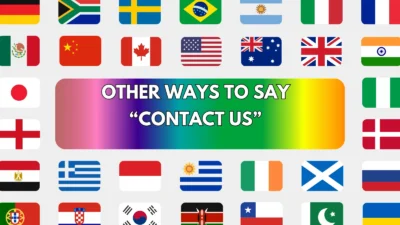Apologizing for taking up someone’s time can feel awkward, especially in professional or polite situations. Saying “Sorry for wasting your time” is direct, but sometimes it may sound too harsh or self-critical. Using alternative expressions can help you sound more respectful, confident, and considerate while still showing sincerity.
Here are 25 better ways to say “Sorry for wasting your time,” with explanations, tone, and examples for different situations — from formal emails to casual conversations.
1. I apologize for taking up your time
Meaning: A formal and polite way to express regret.
Detailed Explanation: Shows genuine respect for the person’s time without sounding overly negative.
Scenario Example: I apologize for taking up your time with these additional questions.
Best Use: Business or professional emails.
Tone: Formal, courteous.
2. I’m sorry if I took too much of your time
Meaning: Expresses politeness while softening the apology.
Detailed Explanation: Shows awareness and respect for their schedule.
Scenario Example: I’m sorry if I took too much of your time during the meeting.
Best Use: Work discussions or after meetings.
Tone: Polite, considerate.
3. Thank you for your patience
Meaning: Expresses gratitude instead of guilt.
Detailed Explanation: A positive way to acknowledge someone’s time and understanding.
Scenario Example: Thank you for your patience while I explained everything.
Best Use: Customer service, teamwork.
Tone: Appreciative, respectful.
4. I appreciate your time
Meaning: Focuses on gratitude rather than apology.
Detailed Explanation: Shows respect for the person’s effort and availability.
Scenario Example: I really appreciate your time and attention today.
Best Use: Emails, meetings, interviews.
Tone: Professional, thankful.
5. Sorry to have kept you waiting
Meaning: A direct but polite apology for delay.
Detailed Explanation: Useful when you’ve caused someone to wait.
Scenario Example: Sorry to have kept you waiting — thank you for understanding.
Best Use: Service situations, calls, appointments.
Tone: Polite, apologetic.
6. My apologies for the delay
Meaning: Apologizes for being late or responding slowly.
Detailed Explanation: Keeps the focus on professionalism.
Scenario Example: My apologies for the delay in getting back to you.
Best Use: Email communication, reports, responses.
Tone: Professional, respectful.
7. Thank you for bearing with me
Meaning: Appreciates someone’s patience and cooperation.
Detailed Explanation: Turns an apology into gratitude.
Scenario Example: Thank you for bearing with me while I sorted that out.
Best Use: Friendly or semi-formal tone.
Tone: Warm, appreciative.
8. I didn’t mean to take up so much of your time
Meaning: A sincere apology without being overly formal.
Detailed Explanation: Sounds natural and genuine in conversations.
Scenario Example: I didn’t mean to take up so much of your time — thank you for listening.
Best Use: Personal or workplace interactions.
Tone: Friendly, apologetic.
9. Sorry for taking longer than expected
Meaning: Acknowledges extended time politely.
Detailed Explanation: Keeps the tone light and responsible.
Scenario Example: Sorry for taking longer than expected with the report.
Best Use: Projects, updates, meetings.
Tone: Courteous, professional.
10. I’m grateful for your time
Meaning: Replaces apology with appreciation.
Detailed Explanation: Positive tone that values the other person’s time.
Scenario Example: I’m grateful for your time and support today.
Best Use: Emails, interviews, mentorship.
Tone: Polite, appreciative.
11. Thanks for your understanding
Meaning: A gentle, thankful alternative to an apology.
Detailed Explanation: Implies appreciation for their patience and empathy.
Scenario Example: Thanks for your understanding as I sorted things out.
Best Use: Customer service or collaborative work.
Tone: Warm, professional.
12. I hope I didn’t inconvenience you
Meaning: Polite and thoughtful expression of concern.
Detailed Explanation: Sounds caring without over-apologizing.
Scenario Example: I hope I didn’t inconvenience you with my request.
Best Use: Formal or semi-formal situations.
Tone: Gentle, polite.
13. My bad for taking so long
Meaning: Casual and conversational apology.
Detailed Explanation: Works well with peers or friends.
Scenario Example: My bad for taking so long to get back to you!
Best Use: Informal chats or team messages.
Tone: Relaxed, friendly.
14. Sorry if I overexplained
Meaning: Apologizes for speaking too much or giving excessive detail.
Detailed Explanation: Ideal for conversations or emails.
Scenario Example: Sorry if I overexplained — I just wanted to be thorough.
Best Use: Work discussions, meetings.
Tone: Friendly, self-aware.
15. I’ll make sure to be more concise next time
Meaning: Professional and solution-oriented response.
Detailed Explanation: Acknowledges time loss while showing accountability.
Scenario Example: I’ll make sure to be more concise next time — thank you for your patience.
Best Use: Formal meetings or presentations.
Tone: Responsible, polite.
16. I didn’t mean to take your whole morning
Meaning: Light-hearted way to acknowledge taking time.
Detailed Explanation: Adds warmth to an apology.
Scenario Example: I didn’t mean to take your whole morning — I appreciate you staying with me.
Best Use: Colleagues, friendly work relations.
Tone: Humorous, friendly.
17. Thank you for listening
Meaning: Grateful and respectful.
Detailed Explanation: Works when you’ve shared something long or emotional.
Scenario Example: Thank you for listening — it means a lot to me.
Best Use: Personal or professional discussions.
Tone: Heartfelt, sincere.
18. I value the time you spent on this
Meaning: Expresses gratitude for someone’s effort.
Detailed Explanation: Emphasizes respect and appreciation.
Scenario Example: I value the time you spent reviewing my work.
Best Use: Formal or appreciative contexts.
Tone: Professional, thankful.
19. I’m sorry for any inconvenience caused
Meaning: Professional and widely accepted apology.
Detailed Explanation: Works in formal letters and customer communication.
Scenario Example: I’m sorry for any inconvenience caused by the delay.
Best Use: Business, service, or client communication.
Tone: Formal, apologetic.
20. Thanks for taking the time to meet
Meaning: Focuses on appreciation instead of regret.
Detailed Explanation: Great for follow-ups after a meeting.
Scenario Example: Thanks for taking the time to meet with me today.
Best Use: Business or interview follow-ups.
Tone: Positive, polite.
21. I appreciate your patience with this matter
Meaning: A professional and polite way to acknowledge their time.
Detailed Explanation: Works well in ongoing discussions or issues.
Scenario Example: I appreciate your patience with this matter while I finalize details.
Best Use: Business emails, problem-solving.
Tone: Courteous, formal.
22. Thank you for your time and support
Meaning: Expresses deep gratitude while sounding professional.
Detailed Explanation: Balances appreciation and humility.
Scenario Example: Thank you for your time and support throughout the process.
Best Use: Work, mentorship, client relations.
Tone: Warm, respectful.
23. I’ll make sure not to take up more of your time
Meaning: Respectful closure after a long discussion.
Detailed Explanation: Shows awareness and gratitude.
Scenario Example: I’ll make sure not to take up more of your time — thank you again.
Best Use: End of meetings or calls.
Tone: Considerate, polite.
24. I’m sorry if this took longer than expected
Meaning: A softer, more diplomatic version of the original phrase.
Detailed Explanation: Acknowledges delay while keeping tone light.
Scenario Example: I’m sorry if this took longer than expected — thank you for your understanding.
Best Use: Project communication or explanations.
Tone: Professional, kind.
25. I appreciate you taking the time to help
Meaning: Shows gratitude for someone’s time and effort.
Detailed Explanation: Leaves a positive impression while recognizing their patience.
Scenario Example: I appreciate you taking the time to help me with this issue.
Best Use: Mentorship, customer service, teamwork.
Tone: Warm, respectful.
Conclusion
Instead of saying “Sorry for wasting your time,” choose expressions that blend apology with appreciation. This keeps your tone positive and professional while showing respect for the other person’s time.
Phrases like “I appreciate your time,” “Thank you for your patience,” or “I apologize for taking up your time” communicate the same sentiment more effectively — helping you maintain good relationships and confidence in every interaction.

Hadi Bhatti is a passionate writer and content creator at Saypadia, known for turning complex words, phrases, and internet slang into simple, easy-to-understand explanations. With a strong interest in language, meanings, and digital communication, Hadi focuses on helping readers understand what words really mean in everyday use. His writing style is clear, engaging, and user-focused, making learning both practical and enjoyable.




